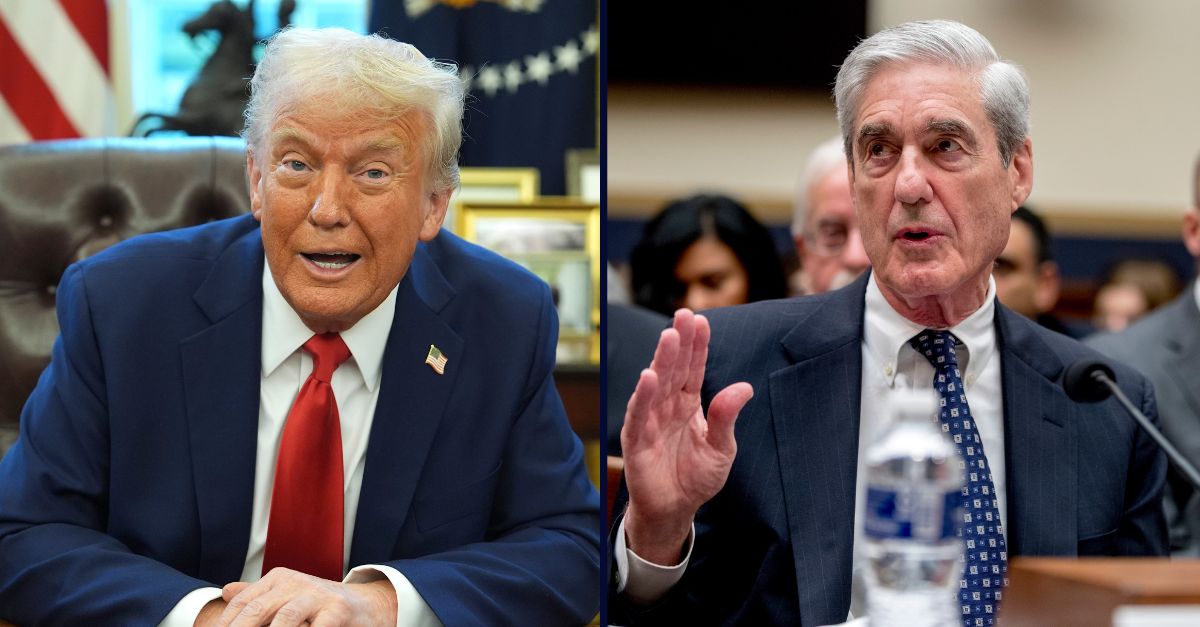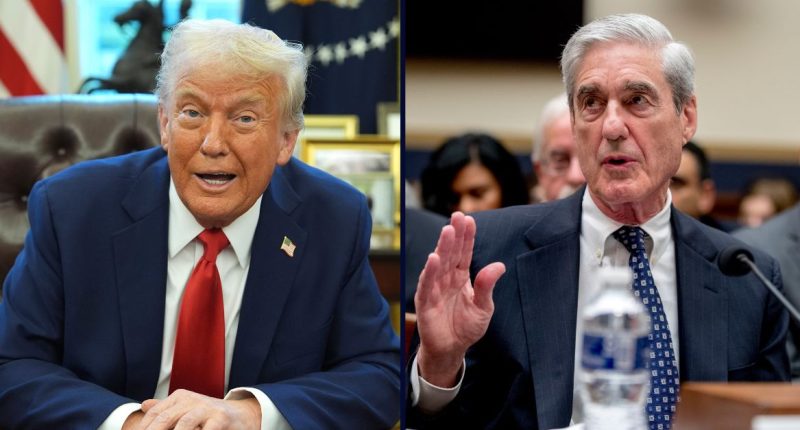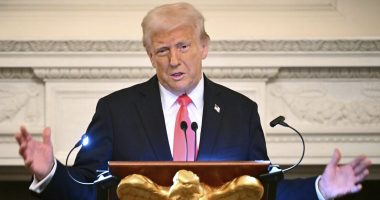Share this @internewscast.com

Left: President Donald Trump delivers remarks after signing an executive directive in the White House’s Oval Office on Monday, February 3, 2025, in Washington, D.C. (AP Photo/Evan Vucci). Right: Former special counsel Robert Mueller testifies before the House Judiciary Committee regarding his inquiry into Russian election meddling on Capitol Hill in Washington, D.C., on Wednesday, July 24, 2019 (AP Photo/Andrew Harnik).
Over 100 former colleagues from the influential law firm Paul, Weiss have authored a letter criticizing the firm’s leadership for conceding to the Trump administration. This decision involved Trump reversing an executive order that targeted the firm in exchange for $40 million worth of free legal services “to support the Administration’s initiatives” and the elimination of any “diversity, equity, and inclusion” (DEI) policies, as per Trump’s statement.
The firm’s actions were a reaction to Trump’s executive order targeting the organization, as he intensified his criticisms of legal professionals and groups he believed to have defended his assumed political adversaries.
“During the first Trump administration, Paul, Weiss lawyers, including many of us, fought to protect civil and human rights with the firm’s support. That is why it came as a shock to find the firm at the very forefront of capitulation to the Trump administration’s bullying tactics,” states the letter, which was addressed to Chairman Brad Karp and publicly released by grassroots advocacy group Common Cause.
“We expected the firm to be a leader in standing up for the legal profession, the adversary system, and the right to counsel,” the letter says. “Instead of a ringing defense of the values of democracy, we witnessed a craven surrender to, and thus complicity in, what is perhaps the gravest threat to the independence of the legal profession since at least the days of Senator Joseph McCarthy.”
The letter was signed by 141 of the firm’s alumni and includes some attorneys who were with the firm as far back as the 1960s. Nearly one-third of the signatories joined onto the letter anonymously out of fear that including their names would lead to professional repercussions.
As Law&Crime previously reported, Trump on March 14 issued an executive order titled “Addressing Risks from Paul Weiss,” labeling the law firm of Paul, Weiss, Rifkind, Wharton & Garrison LLP as a national security threat. The firm has links to former special counsel Robert Mueller, Trump’s criminal prosecution in Manhattan, and lawsuits sparked by the Jan. 6, attack on the U.S. Capitol.
Much of the language echoes that of a previously issued executive order aimed at Hillary Clinton-linked law firm Perkins Coie, as well as a February order focused on the firm Covington & Burling, linked to former special prosecutor Jack Smith.
As with prior memos, Trump ordered various agency heads to “immediately take steps consistent with applicable law to suspend any active security clearances” held by individuals at the firm. He also ordered the Office of Management and Budget to “identify all Government goods, property, material, and services, including Sensitive Compartmented Information Facilities, provided for the benefit of Paul Weiss” — and that such provisions be ceased “expeditiously.”
Less than a week later, on March 20, Trump announced that he had “agreed to withdraw” the Paul, Weiss order after the firm agreed to make the aforementioned concessions, a move many saw as capitulating to the president’s retributive and possibly unlawful whims.
Karp over the weekend told firm employees that Trump’s EO was an “unprecedented threat” to their professional survival and that had he not made a deal it was “very likely that our firm would not be able to survive a protracted dispute with the Administration.”
However, that was apparently not enough to appease at least a portion of the firm’s estimated 4,100 alums.
“This is not a matter of partisan politics. At a time when judges are threatened with violence and impeachment for applying the rule of law, the very independence of lawyers and the legal profession is at stake. We are therefore profoundly saddened, and deeply outraged, that the firm in which we heretofore took pride has cowardly allowed itself to become instead a poster child for the administration’s efforts to silence dissent and impose a loyalty test on attorneys,” the letter states. “In your post-surrender message to the firm, you expressed the view that the firm could now ‘put the matter behind us.’ That statement is not just bad lawyering compounding bad negotiating, it is false. It is already clear that the President is claiming that the firm gave away more than it admits. Even worse, from the standpoint of posterity, it is a permanent stain on the face of a great firm that sought to gain a profit by forfeiting its soul.”
Trump’s Paul, Weiss executive order — targeting a law firm linked to the president’s perceived enemies — was the third of its kind. Earlier in March, he issued an executive order aimed at Hillary Clinton-linked law firm Perkins Coie, and in February he targeted the firm Covington & Burling, linked to former special prosecutor Jack Smith.
The announcement appeared to have an immediate effect on at least one other high-profile law firm: a Chicago-based associate of Skadden Arps announced her resignation on Thursday, citing “Paul Weiss’ decision to cave to the Trump administration on DEI, representation and staffing” as having “forced [her] hand].”
Love true crime? Sign up for our newsletter, The Law&Crime Docket, to get the latest real-life crime stories delivered right to your inbox.

















